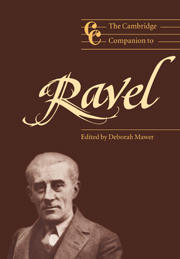Book contents
1 - History and homage
from Part I - Culture and aesthetic
Published online by Cambridge University Press: 28 September 2011
Summary
One should not expect a composer’s works to be entirely personal creations, offering no analogy whatever with the achievements of his predecessors.
ravelAn artist should be international in his judgments and esthetic appreciations and incorrigibly national when it comes to the province of creative art.
ravelRavel and authority: the Conservatoire and the Prix de Rome
Ravel informed Cipa Godebski in Spring 1914: ‘I am transcribing a Forlane by Couperin. I will see about getting it danced at the Vatican by Mistinguett and Colette Willy in drag.’ This excerpt reveals Ravel's decidedly ambivalent attitude towards the establishment which was so marked during his early career and which he directs here towards the Church and hostile critics. Klingsor noted that the young Ravel was ‘given to mocking but [was] secretly set in his purposes’, while Cortot recalled ‘a deliberately sarcastic, argumentative and aloof young man, who used to read Mallarmé and visit Erik Satie’. Both these descriptions touch on crucial aspects of Ravel's character: a conflict between ‘individual consciousness’ and conformity. Ravel's sense of direction was already well developed from his days at the Conservatoire. He had willingly succumbed to the influence of Poe and Mallarmé, and his musical tastes included Chabrier and the anti-establishment figure, Satie. Much to the frustration of some of his teachers, Ravel was only teachable on his own terms. Reports from Bériot, his piano teacher, indicate an untameable temperament which is ‘not always with full control’ and ‘needs to be held in check’, and even the sympathetic Fauré damns with faint praise, stating that he was, in time, ‘less exclusively attracted than before by pursuit of the excessive’.
- Type
- Chapter
- Information
- The Cambridge Companion to Ravel , pp. 5 - 26Publisher: Cambridge University PressPrint publication year: 2000
- 6
- Cited by



